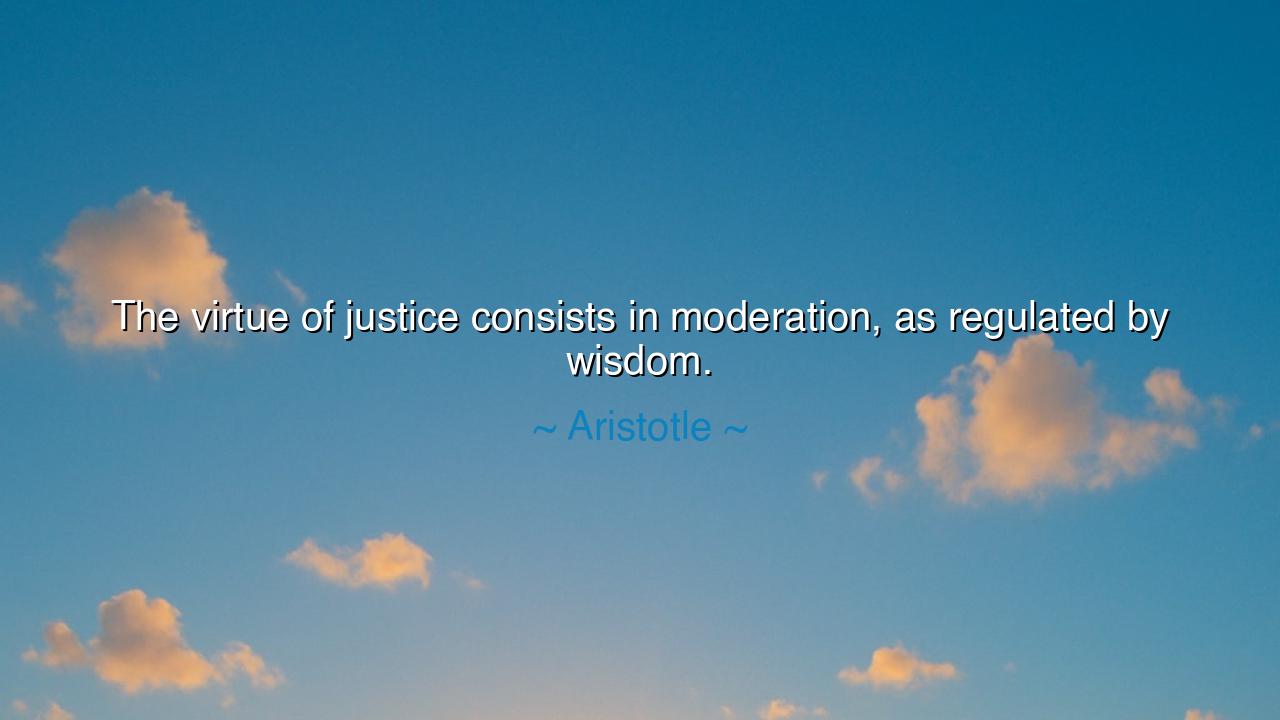
The virtue of justice consists in moderation, as regulated by






In the ancient world, where empires rose and fell like the tides, the great philosopher Aristotle sought to uncover the eternal principles that guide the flourishing of humankind. Among his teachings, he declared, “The virtue of justice consists in moderation, as regulated by wisdom.” These words shine like a beacon across the ages, revealing that true justice is neither born of blind passion nor cold detachment, but of balance—carefully measured by the light of wisdom.
Justice, at its core, is the art of giving to each what is rightly theirs. Yet when wielded without moderation, it can transform into vengeance, cruelty, or oppression. A ruler who punishes too harshly breeds fear and rebellion, while one who is too lenient invites chaos and disorder. Moderation is the sacred middle path, ensuring that justice remains a healer rather than a destroyer. But this moderation cannot be found by instinct alone; it must be guided by wisdom, the ability to discern the deeper truths beneath the surface of human affairs.
History offers a powerful example in the life of Solon, the ancient lawgiver of Athens. Faced with a city torn by the extremes of wealth and poverty, Solon did not side with either the elites or the masses. Instead, he used wisdom to craft laws that balanced the needs of both, relieving the burdens of the poor without destroying the foundations of the state. Through moderation, he preserved Athens and laid the groundwork for the democracy that would later flourish. His actions embody Aristotle’s vision: justice achieved through balance and reason, rather than extremes.
By contrast, when justice strays from moderation, ruin follows. The French Revolution began with noble ideals of liberty and equality, but as passion overtook wisdom, the pursuit of justice turned into the Reign of Terror. Guillotines replaced courts, and suspicion replaced reason. In their zeal to right past wrongs, the revolutionaries abandoned moderation, and their nation drowned in blood. Here, the absence of balance revealed the danger of justice pursued without wisdom.
Let this teaching be carved into the hearts of rulers and citizens alike: justice is a delicate flame. Too fierce, and it burns all it touches; too faint, and it fails to give light. Moderation, guided by wisdom, keeps this flame steady, warming the people and illuminating the path of peace. Those who govern must seek not only to punish or reward but to understand, weighing every decision with humility and foresight. For in the harmony of justice lies the strength of nations, and in its balance, the hope of all mankind.






HNHoa Nguyen
This quote makes me consider personal responsibility in ethical decision-making. It implies that justice is more than enforcing rules; it is about applying discernment and avoiding extremes. How can ordinary people practice this balance in daily life, in interactions and conflicts? I’m curious whether education in ethics, philosophy, or civic duty can enhance our capacity for moderated justice, and how communities can encourage a culture where wisdom guides fairness consistently.
QTLe Quyen Tran
I feel intrigued reading this because it highlights the subtlety required for true justice. It suggests that extremes, whether excessive leniency or harshness, can undermine fairness. I wonder how modern institutions incorporate this principle, and whether legal systems prioritize moderation as Aristotle envisioned. Could technology, data, and precedent support wise moderation, or does it always require human judgment and moral insight to achieve this delicate balance?
KHLuon Khanh Huyenn
This perspective feels both idealistic and deeply practical. It implies that justice without wisdom could become rigid or extreme, while wisdom without justice could lack moral grounding. How do individuals, judges, or leaders cultivate the ability to balance these forces in real life? Are there methods for training people to recognize when moderation serves fairness best, or is this an innate quality developed through experience and reflection?
NNguyen/Tra/My
Reading this evokes curiosity about the relationship between justice and wisdom. If moderation is key, how do we determine the proper measure in complex cases? I also wonder whether cultural, historical, or situational contexts affect what is considered moderate or fair. Is there a universal standard for justice, or is it always relative to society’s values and norms? I’d like a perspective on how Aristotle’s idea of moderation translates to contemporary legal and ethical frameworks.
VANguyen Van A
This quote makes me reflect on how justice is not simply about strict rules or harsh punishments, but about balance guided by understanding. I wonder how societies can practically achieve this moderation—does it require wise leadership, educated citizens, or both? Could there be situations where applying moderation might be seen as weakness rather than fairness? It raises questions about the role of wisdom in interpreting laws and moral codes in a way that truly serves the common good.